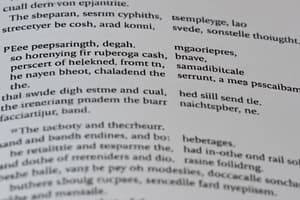Podcast
Questions and Answers
¿Cuántos géneros gramaticales tiene el idioma ruso?
¿Cuántos géneros gramaticales tiene el idioma ruso?
- Tres géneros (correct)
- Cuatro géneros
- Cinco géneros
- Dos géneros
¿Cuántos casos gramaticales existen en ruso?
¿Cuántos casos gramaticales existen en ruso?
- Cinco casos
- Seis casos (correct)
- Siete casos
- Cuatro casos
¿En qué posición suelen estar los verbos en la estructura de las oraciones rusas?
¿En qué posición suelen estar los verbos en la estructura de las oraciones rusas?
- Después del sujeto (correct)
- En medio de la oración
- Al final de la oración
- Antes del sujeto
¿Qué función tienen los adverbios en ruso?
¿Qué función tienen los adverbios en ruso?
¿Qué parte de la oración reemplazan los pronombres en ruso?
¿Qué parte de la oración reemplazan los pronombres en ruso?
¿Cuál es una característica destacada del vocabulario ruso?
¿Cuál es una característica destacada del vocabulario ruso?
¿Qué hermanos griegos desarrollaron el alfabeto cirílico utilizado en la lengua rusa?
¿Qué hermanos griegos desarrollaron el alfabeto cirílico utilizado en la lengua rusa?
¿Qué significado tiene la palabra 'obshestvennost' en ruso?
¿Qué significado tiene la palabra 'obshestvennost' en ruso?
¿Qué característica distingue la estructura de las oraciones en ruso de la del inglés?
¿Qué característica distingue la estructura de las oraciones en ruso de la del inglés?
¿Qué son los morfemas derivativos en la lengua rusa?
¿Qué son los morfemas derivativos en la lengua rusa?
¿Cuál es un ejemplo de una estructura compleja de oración en ruso?
¿Cuál es un ejemplo de una estructura compleja de oración en ruso?
¿Qué característica del idioma ruso hace que sea único y fascinante en términos gramaticales?
¿Qué característica del idioma ruso hace que sea único y fascinante en términos gramaticales?
Flashcards
Russian Grammar
Russian Grammar
Russian grammar uses inflectional morphology, meaning word endings change based on grammar function, instead of word order.
Russian Noun Gender
Russian Noun Gender
Russian nouns, pronouns, adjectives, participles, numerals, and pronouns have three genders: masculine, feminine, and neuter.
Russian Cases
Russian Cases
Russian has six cases: nominative, genitive, dative, instrumental, accusative, and prepositional. Each case has different forms.
Russian Verb Structure
Russian Verb Structure
Signup and view all the flashcards
Russian Verb Moods
Russian Verb Moods
Signup and view all the flashcards
Cyrillic Alphabet
Cyrillic Alphabet
Signup and view all the flashcards
Russian Vocabulary
Russian Vocabulary
Signup and view all the flashcards
Russian Sentence Structure
Russian Sentence Structure
Signup and view all the flashcards
Russian Word Order
Russian Word Order
Signup and view all the flashcards
Russian Complex Sentences
Russian Complex Sentences
Signup and view all the flashcards
Russian Word Derivation
Russian Word Derivation
Signup and view all the flashcards
Russian Pronouns
Russian Pronouns
Signup and view all the flashcards
Study Notes
Introduction
The Russian language is one of the most widely spoken languages in Europe and the northern part of Asia. It is the third most commonly used language on the Internet according to comScore. Let's delve into the intricacies of this fascinating language through its grammar, vocabulary, and sentence structure.
Grammar
Russian grammar follows the rules of inflectional morphology, meaning that word endings change based on grammatical function rather than word order. Here are some key aspects of Russian grammar:
-
Gender: Nouns, pronouns, adjectives, participles, numerals, and pronouns have three genders: masculine, feminine, and neuter.
-
Cases: There are six cases in Russian: nominative, genitive, dative, instrumental, accusative, and prepositional. Each case has its own set of definite and indefinite forms.
-
Verbs: Verbs follow the subject in Russian, unlike in English where they usually come before it. Russian verbs have several moods: indicative, imperative, conditional, jussive, interrogative, optative, and potential.
-
Adverbs: Adverbs modify other parts of speech like verbs, nouns, or adjectives.
-
Pronouns: Pronouns replace nouns to indicate gender and number.
Vocabulary
Russian vocabulary is vast and diverse. Here are some terms that help illustrate the language's richness:
-
Cyrillic Alphabet: The Russian language uses Cyrillic script, which was developed by two Greek brothers, Saints Cyril and Methodius in the 9th century CE.
-
Words with English Equivalents: There are several words in Russian that have no direct translation into English but are used extensively in everyday life, such as "obshestvennost", meaning social skills or etiquette, or "tolkovatel", meaning interpreter.
-
Word Derivation: Many Russian words use derivational morphemes, which change based on context.
Sentences
Sentence structure in Russian follows Subject-Verb-Object order (SVO). This contrasts with English usage where word order often indicates the grammatical relationship between elements. Furthermore, Russian uses a complex sentence structure. For example, this sentence consists of five clauses nested within each other: "Бывший министр обороны России Сергей Шойгу не пожалел своего времени" ("Former Minister of Defense of Russia, Sergey Shoygu, did not spare his time").
In summary, the Russian language boasts a unique and fascinating grammar system that involves inflectional morphology, complex cases, verb moods, pronunciations, and more. Its extensive vocabulary, rooted in Cyrillic script, provides nuanced ways to express ideas. Lastly, its sentence structures offer intricate patterns for conveying information and ideas.
Studying That Suits You
Use AI to generate personalized quizzes and flashcards to suit your learning preferences.




